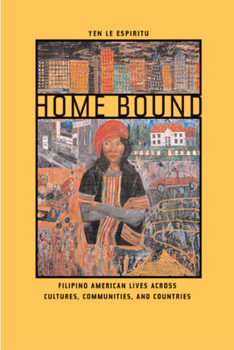Home Bound: Filipino American Lives Across Cultures, Communities, and Countries
Select Format
Select Condition 
Book Overview
Filipino Americans, who experience life in the United States as immigrants, colonized nationals, and racial minorities, have been little studied, though they are one of our largest immigrant groups.... This description may be from another edition of this product.
Format:Paperback
Language:English
ISBN:0520235274
ISBN13:9780520235274
Release Date:May 2003
Publisher:University of California Press
Length:282 Pages
Weight:0.90 lbs.
Dimensions:0.7" x 6.4" x 8.8"
Customer Reviews
1 rating
A must-read Asian American Studies, Post-Colonial Studies, Immigrant Studies Text
Published by Thriftbooks.com User , 18 years ago
Yen Le Espiritu, in her book, Home Bound: Filipino American Lives Across Cultures, Communities, and Countries, "contends that Filipino American racial formation is determined not only by the social, economic, and political forces in the United States but also by U.S. (neo)colonialism in the Philippines and capital investment in Asia" (1). Moreover, not content with the narrow, one-sided focus that Filipinos are transformed through the experience of colonialism and migration, Espiritu highlights how Filipinos "in turn transform and remake the social world around them" (2). Home Bound is most specifically an ethnographic study of Filipino Americans in and around San Diego, CA, that is grounded nicely by Espiritu through U.S. immigration laws, U.S. imperialism and colonialism, and intersectional analyses. Espiritu presents the experiences of Filipino Americans in order to educate us about this often overlooked population through their own voices. Scholars in Women's Studies and Gender Studies may be especially drawn to chapter 7, where Espiritu focuses on the way gender is used by racialized immigrants to assert their superiority over the dominant (white). In this chapter Espiritu turns to second generation daughters and the way in which it is through them, specifically the enforcement of their "female morality-defined as women's dedication to their families and sexual restraint" (160), that racialized immigrants construct themselves as superior. In other words, in light of the racist oppressions they face, one method of responding that immigrants have deployed is to assert their (daughters') moral superiority over whites. Through the lens of generations (first, second, etc.) of immigration, Espiritu challenges us to think of the multiple, intersectional systems, at play, while making clear that this manner of response is not without its own complications and contradictions (namely, the perpetuation of sexist oppression and patriarchal power over daughters). In addition, I found particularly compelling the end of Espiritu's book, chapters 8 and 9, where she delves more in depth to the ways in which Filipino Americans transform and remake the world around them. These two chapters excitingly point to the new and creative relations constructed by Filipino Americans in regards to cross-racial social relations and immigration as a technology of racialization and gendering.




